
Voyaging
You’re never too old for experiential learning and adventure.
Adventure with meaning
These cruises are real. You will be a crew member of an ongoing public research voyage: Ocean Pi. Classrooms and individuals around the world will be connected to our work because of your service—thank you.
So come immerse in nature, get to know the ocean, disconnect from technology, and experience wonder as you learn like its adult kindergarten.
We can’t wait to meet you, shipmate.
Nov.-Dec. 2024 | Detroit, MI to Eleuthera, Bahamas
The words of House Stark, “Winter is Coming,” will ring true as we race the cold from the Great Lakes to the Bahamas. Starting from Wonder’s home in Detroit, we will sail to Anticosti Island in the Gulf of St. Lawrence where we can finally turn south towards the receding sun. The first phase of the voyage will be late fall and early winter weather and likely feature a port stop in Montreal and/or Halifax. From Nova Scotia we will sail west across the Gulf of Maine to Boston and celebrate Thanksgiving aboard Wonder in either New York City or Boston, depending on weather.
Wonder will then continue south along the coast of New Jersey and into both Delaware Bay and Chesapeake Bay to do some science. As with our voyage north this past summer, we expect to skirt Cape Hatteras via the Intracoastal Waterway. We expect to enter the waterway in Norfolk, VA and re-emerge in either Moorehead City or Southport, NC. From there, we sail to our winter home of Jacksonville, FL for a brief visit before continuing south to the Bahamas.
We expect to arrive in the Bahamas on December 20 where our crew will enjoy a well earned respite in the tropical sunshine. We will turn back around to sail to Jacksonville during the first week of 2025.
Voyage Plan
No Sailing Experience? No Problem!
In fact, that is kind of the point. Most of the students on semester-at-sea programs have never set foot on a sailboat and this voyage is designed to mimic that experience.
We will teach you the skills you need to stand watch and, from there, you will have the opportunity to go as deep as you like on a number of topics: meteorology, sail handling, navigation, oceanography, and more. Standing watch is where much of the learning happens.
We also teach hands-on classes throughout the voyage. As we go through the routines of setting/striking sails, navigating, and steering, you will get ample opportunities to practice new skills alongside a knowledgeable crew member.
And don’t worry, there is also time to relax and take it all in.
Tuition and Compensation
In future years, we plan to break our seasonal voyages into small 5-6 day legs that adventurous adults can pay to join as crew. We do not carry “passengers” on long distance voyages—even Planet School students will be crew. These paid voyage legs will be the eco-adventure vacation of a lifetime and form part of our non-tuition revenue stream…but we aren’t quite there yet. Therefore, we are looking for individuals who have skills they can offer to the ship, to their shipmates, and to the Ocean Pi project instead of paying to join. Here is what we are offering prospective crew:
Room and board on Wonder for the entirety of the voyage, including port stops. You can dine ashore during port stops if you wish at your own cost.
Instruction in sail handling, navigation, watch-standing, meteorology, and the many other skills required to successfully navigate a sailboat across oceans.
An amazing community of like-minded adventurers. There is an amazing bond formed between shipmates when accomplishing a voyage of this magnitude. You will walk away from this voyage with friends for life.
If we meet our fundraising goals and have a successful winter season in Florida, we will share a bonus payout with crew to show our gratitude. However, we cannot promise if or when this will happen.
Available Crew Positions
-
We are looking for mates with experience leading a watch on tall ships, preferably in an education context. A Master or Mate credential (with sailing endorsement) is preferred but not required and you will be required to pass a pre-employment drug test.
We will have three watch groups that stand 6 hour watch rotations with the possibility of a 3 hour afternoon dog watch. The right candidate will be excited about sharing their knowledge with their watch group. Each mate will have a deckhand on their watch who has experience on either Wonder itself or a comparable tall ship plus two additional watch members who might have zero sailing experience.
Skills that a successful applicant will be expected to possess include:
Sail handling knowledge
Rules of the Road
Bosunry and sail/line repair
Plotting positions using deduced reckoning, celestial, and GPS fixes
Heavy weather experience
Taking weather observations and comprehending forecasts
Leading a team
Balancing multiple demands for your attention simultaneously.
-
Do you love telling stories with video? Are you looking to embed yourself in an experience that could result in a competitive short film? Are you passionate about the ocean, fighting climate change, education, sailing, or all of the above? We want to hear from you.
We are searching for two experienced videographers to work together and independently to shoot, edit, and publish videos that tell the story of Ocean Pi, Wonder, and the Planet School. You will stand watch as a member of the crew and participate in all aspects of ship life in addition to video work. You will work with the captain to create a video strategy in advance of the voyage and then execute that strategy.
-
The Ocean Pi project is built on three separate Raspberry Pi computers connected to various sensor arrays. We are searching for someone who has a bunch of amazing projects they have done with Raspberry Pi or Arduino and is looking to help build Ocean Pi. You will help maintain the hardware aboard the ship, work with students remotely who are participating in Ocean Pi, mobilize the open source community, and help lead the Ocean Pi project. You should be comfortable with Python and have ideas about how we can best get the data from the sensors into the hands of students via the ship's Starlink internet connection. Teaching experience is a major plus.
-
We are looking for someone lit up by the idea of building an interactive oceanography education project aboard Wonder. You will work alongside the Python Data Scientist on the Ocean Pi project with a particular focus on projects that do not require coding. You will also work with the video team to create educational content about the voyage.
-
Taking photos, making reels, and crafting the brand identity of Wonder and the Ocean Pi voyage on social media will be your strategic responsibility. Given the amount of time that teens (and adults) spend on social media, reaching youth on these channels will be essential to the voyage's success. As with all other crew positions, you will work closely with other members of the team to help generate content. But brand voice, cadence of posting, interactions, collaborations, and all other aspects of the voyage's online identity will be your charge.
-
Don't have any of the background required for our other roles but still eager to come on the voyage? This is the role for you. Your primary responsibility will be all things Wonder, including repair/upgrade projects, assisting with our education mission, and navigating. This role requires someone with sailing background since you will be the Mate's #2 person on watch as your watchmates learn the ropes.
If any of these roles interest you, please email Wonder’s captain and the Planet School’s Head of School at thane@planetschool.org. Please include a resume or link to your LinkedIn profile and an overview of 1) any sailing experience (please be candid—this is rarely a deal-breaker), 2) why you want to join the voyage, 3) summary of what you would bring to the ship’s company, including relevant experience for the role you are interested in.
The Voyaging Experience
Standing Watch
During each segment of the voyage we will all stand watch. These are usually broken into 6 hour shifts that three watch groups rotate through. This means you stand watch for 6 hours, followed by a 12 hour break. During watch, you and your watch mates are responsible for the ship’s operations: setting sails, steering, plotting our position, and cooking meals (to name a few duties). While you can certainly be social with your shipmates, you are on duty. Here is the watch schedule we follow:
Morning Watch: 0700-1300
Afternoon Watch: 1300-1900
Midnight Watch: 1900-0100
Dawn Watch: 0100-0700
What to Pack
You should pack for summer and winter, but especially for winter. The first 60% of the voyage will be very cold. It is important to have layers, sun protection, rain protection, and shoes (Blundstones are a favorite) or captured-heel sandals (e.g. Chacos) that you will be comfortable standing in for several hours.
Meals
All meals happen at the watch change and are prepared by the watch on duty. Meals should be ready 30 minutes before the watch change so that the oncoming watch can eat before they take the deck. The off-coming watch and the off watch (also called the “lazy watch”) eat together once the off-coming watch is relieved at the top of the hour.
Since we have very limited refrigerator space on board as well as an ice chest, our menu will be limited but still hearty and delicious. We have vegetarian options, but we cannot accommodate vegan or other diets on these first voyages. Common meals include:
Breakfast: breakfast burritos, pancakes, steel-cut oatmeal, scrambled eggs and sausage, french toast.
Lunch: sandwiches, quesadillas,
Dinner: stews, jambalaya, lasagna, pasta,
Coffee, tea, hot chocolate, water, and gatorade are available 24/7.
Voyage Components
Arrival Day: for each of these voyages, we ask crew to arrive in the afternoon or evening of the first day. When you arrive, you can move into your bunk, get to know the ship, and relax before our evening welcome meeting. For the weekend segments, we will get underway that evening. For the longer trips, we will get underway the following morning after 0700 breakfast (subject to tides and weather) or that evening.
Underway: While we are underway, we will follow the watch standing schedule. In addition to this schedule, we will have a daily ship’s meeting at 1500 each day which will include a lesson on some aspect of oceanography or seamanship. We will also have impromptu classes when the conditions are right, such as a clear sky for celestial navigation or spotting wildlife.
Anchoring: Occasionally we will spend the night at anchor. We will still stand watch, but it will be on a different schedule to give everyone some rest. It is important that we stay vigilant against the anchor dragging or other ships not seeing us.
Field Day: Every week, traditionally on Sundays, we have Field Day. On student voyages, this is the only time we break out Bluetooth speakers as we deep clean the whole ship. We will have Field Day towards the end of each segment so that the ship is clean for the next group of oncoming crew.
Swizzle: “Swizzle” is the very official nautical term for a party at sea. The final night of every voyage we come together as a ship’s company dressed in our finest ship’s clothing and costumes for a talent show, singing of sea shanties, and sharing of memories from the voyage.
Typical Day
The primary driver of the daily schedule is the watch schedule, but there are also daily fixtures to the schedule regardless of watch. While no day is “typical” when you are voyage sailing, here is what your day might look like when you have Morning Watch:
0620: Personal wakeup from a member of Dawn Watch.
0630: Breakfast with your watch (Dawn Watch made buckwheat pancakes!) and a large cup of delicious coffee before heading up for the watch change.
0650: Muster on deck for watch turnover. We muster for turnover 10 minutes before the hour so that the off-going watch is relieved on time.
0700: You start out watch steering the boat. With a lovely breeze coming from the starboard quarter, she steers easily while sailing downwind. As the wind calms down, you help set a few more sails.
1030: You help distribute a morning trail mix snack and spot a pod of dolphins at the bow of the boat racing us.
1220: Watch is nearly over! You head below to wake up the Afternoon Watch crew.
1300: You are relieved by the Afternoon Watch and eat a bowl of chili on deck for lunch that your watch mates made. You decide to spend the afternoon reading on deck.
1500: Everyone gathers for the daily ship’s meeting. You learn about the weather forecast for the next few days and share ship’s announcements. There is a lesson about how to use a sextant to determine your position with the stars.
16:00: Perhaps a nap or a game with your shipmates? Or playing the ship’s guitar on the quarterdeck?
1900: Dinner on deck: lasagna. Then off to bed so that you can be rested for your next watch at 0100. You look forward to using the sextant for the first time at dawn.
Safety
A very common and very legitimate concern is “What happens if the ship sinks?” We have copious amounts of safety gear on board to try and contain any emergency that could lead to sinking (e.g. fire, collision). If we must abandon ship, we have safety gear to assist in a speedy rescue and keep us safe while we await assistance. This includes redundant EPIRB beacons that auto deploy, redundant VHF radios, life vests for everyone on board, and life rafts with emergency rations that will auto deploy.
Every crew member will participate in Man Overboard, Fire, and Abandon Ship drills to familiarize you with this gear and the procedures for using it.


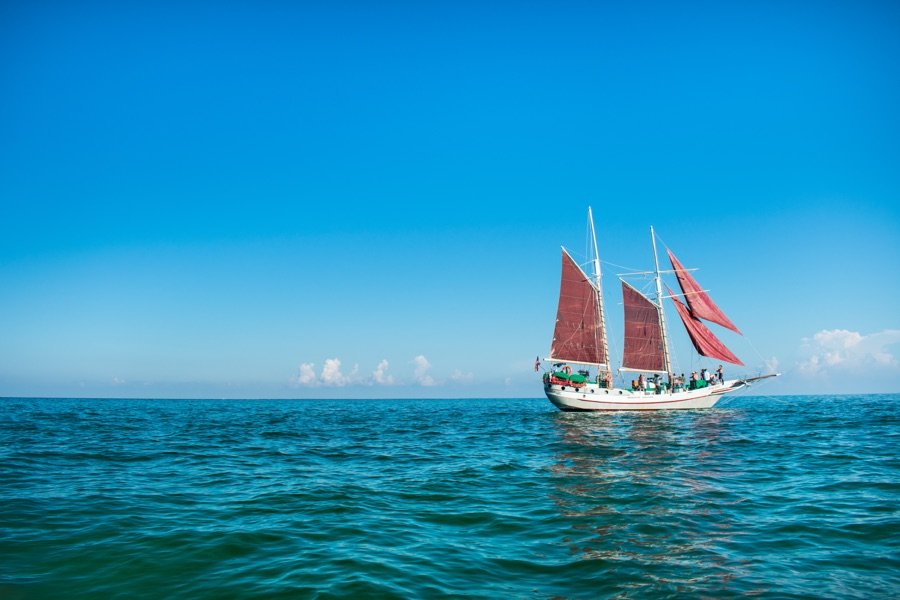
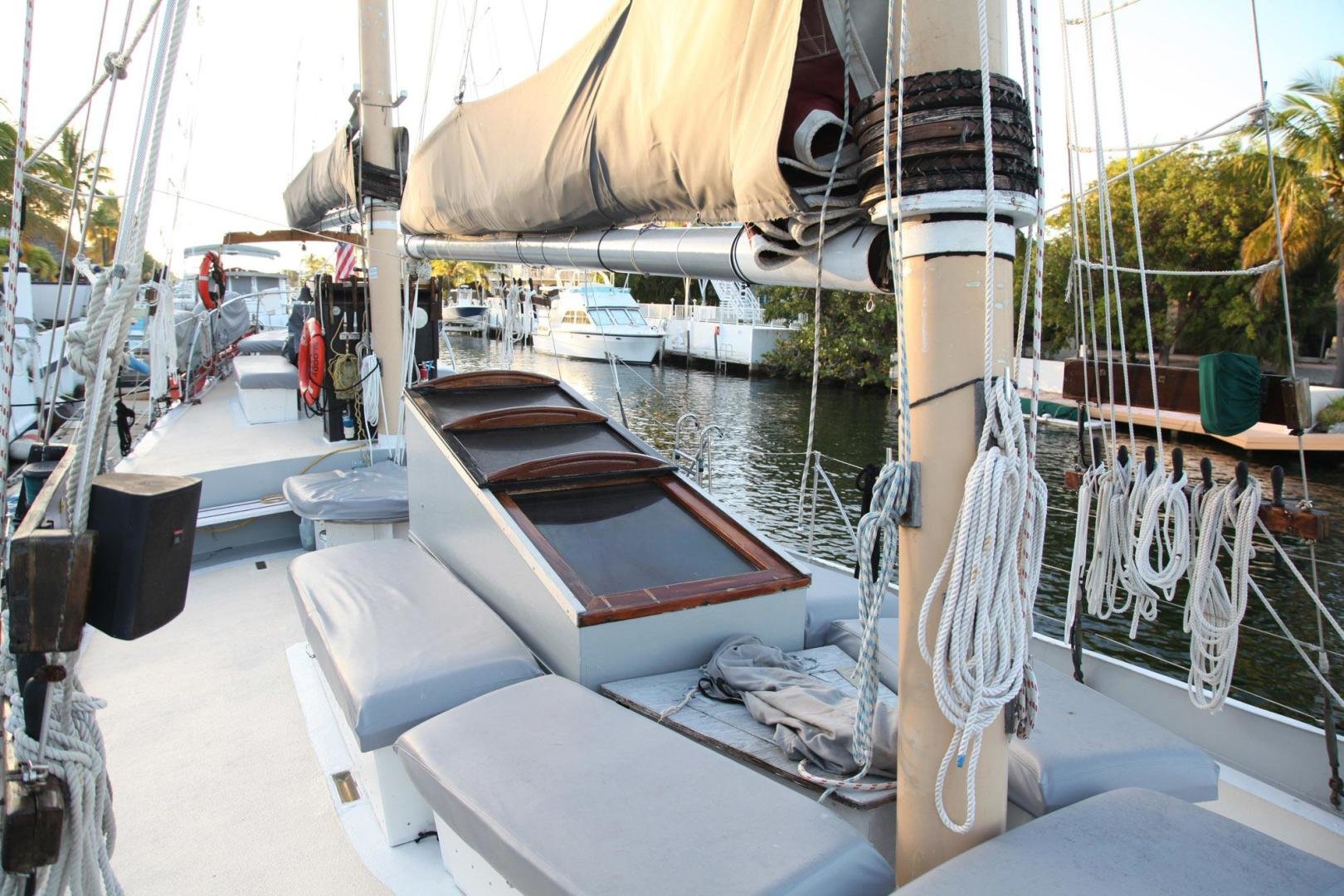
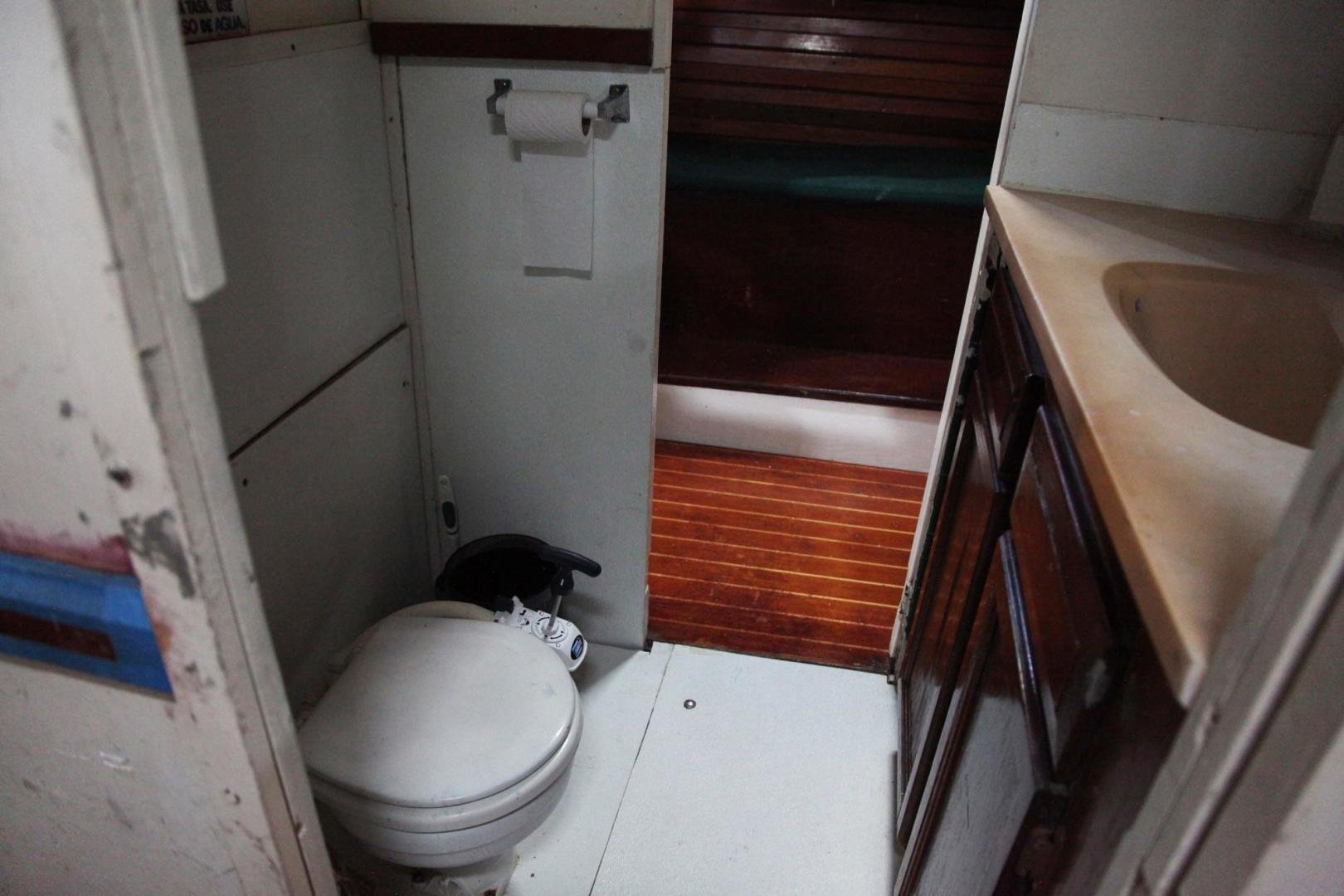





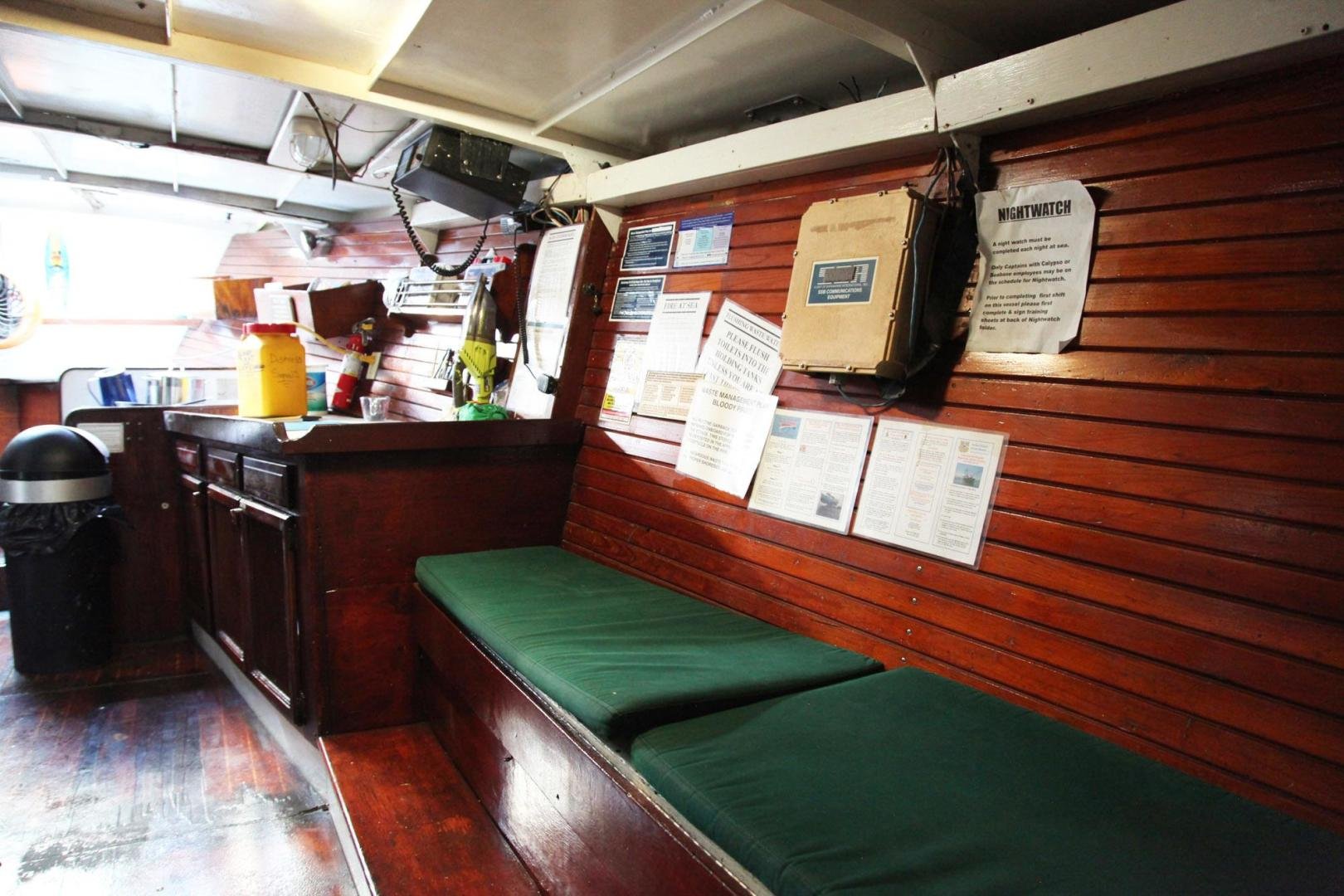





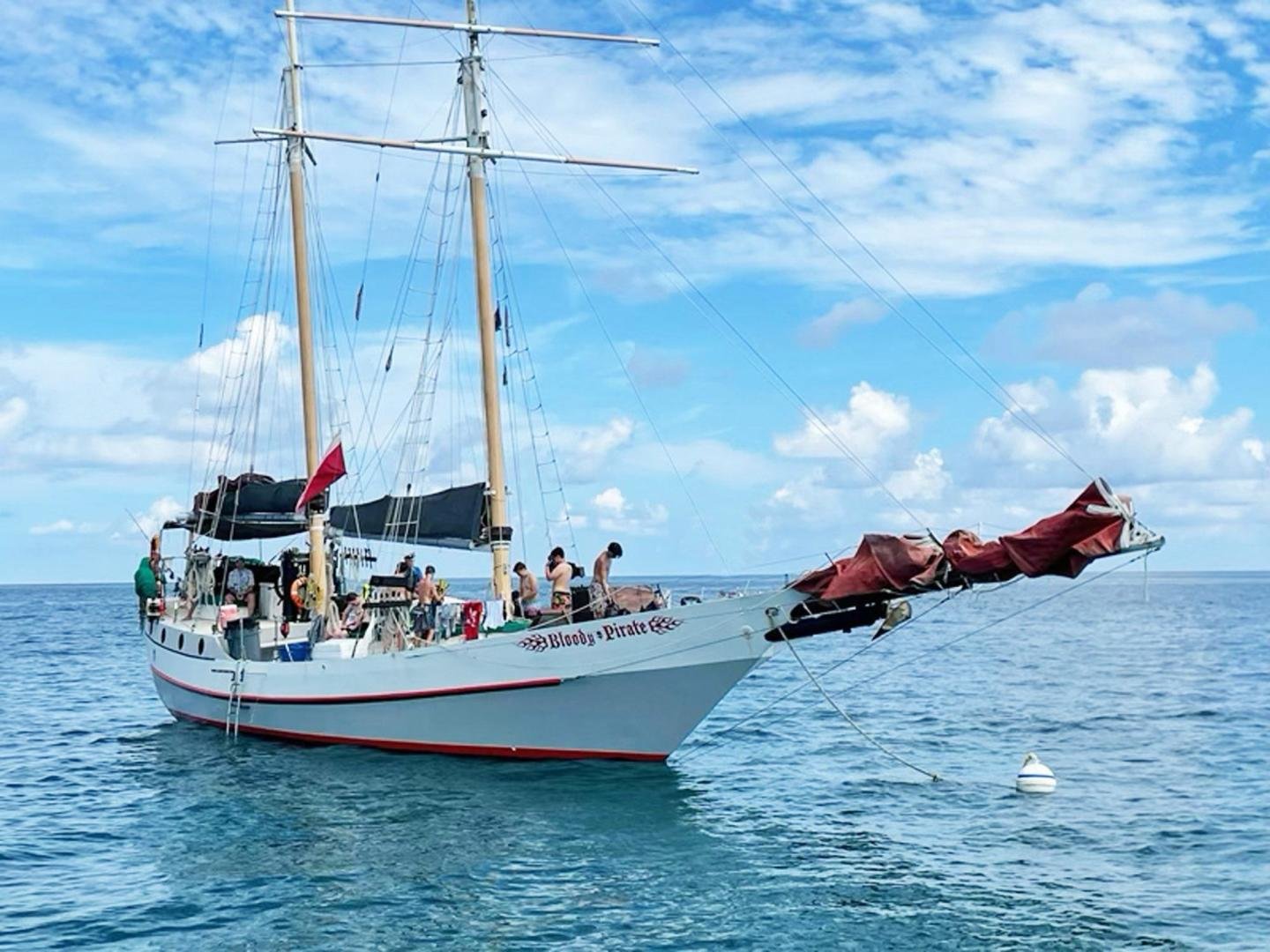









About the Boat
Wonder is an 82 foot gaff-rigged schooner with a bowsprit that extends from the bow to make her 82 feet in length overall.
Wonder was built in 1988 and is a custom designed schooner with a steel hull. She has 17 bunks and is certified by the Coast Guard to carry 24 passengers overnight and 38 passengers during the day. Her sister ship, Jolly Rover II, is one of the most popular schooners in Key West and its owner, Bill Malone, serves as an advisor and mentor the Planet School. Wonder was previously named Bloody Pirate and Heritage of Miami.
Length Overall (LOA): 82.00 ft.
Beam: 16 ft.
Draft: 5.50 ft.
Keel: Concrete.
Sails: 1-Fore Sail, 1-Main Sail,1-Square Sail, 3-Head Sails, 1-Granny, all tanbark (red).
Engine: 215 hp Cummins
Tankage: 150 gallons of freshwater and 250 gallons of diesel tankage.
Heads: 2



